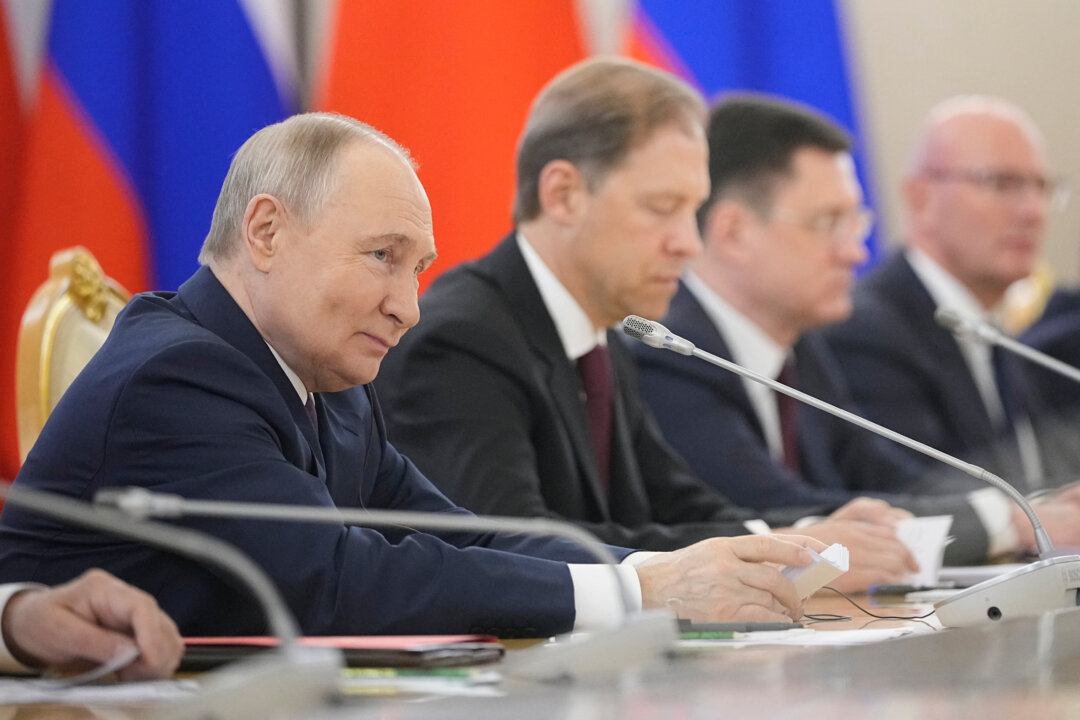The CCP leader is on his 11th visit to Russia since coming to power more than a decade ago.
Chinese leader Xi Jinping met Russian President Vladimir Putin on May 8, further strengthening the collaboration between their nations in the face of external challenges.
During the bilateral meeting in the Kremlin, Xi said that China and Russia should remain committed to cooperation and “eliminate external interference,” according to the readout from China’s foreign ministry.
Xi arrived in Moscow on May 7, kicking off his 11th visit to the country since coming to power more than a decade ago.
The four-day trip comes at a time when the Chinese Communist Party (CCP) faces increasing scrutiny from the United States over issues such as fentanyl precursor production and non-market trade practices, which U.S. President Donald Trump has cited as a reason for his recent tariff hikes against the country.
It also occurs as Russia grapples with pressure from the United States in talks aimed at ending the war in Ukraine.
In a show of solidarity, Xi and Putin issued a lengthy joint statement reaffirming their commitment to deepening the partnership between their neighboring countries. Chinese and Russian officials also signed more than 20 documents aimed at enhancing cooperation in various sectors, including the digital economy and film production.
Following their talks, Putin said at a joint press conference that these agreements are designed to significantly boost trade and investment between the two nations by 2030, according to the Kremlin.
Xi told the media that China and Russia should continue the partnership for generations, “becoming true friends of steel that have been through a hundred trials by fire,” according to Beijing’s foreign ministry.
The two leaders have repeatedly affirmed a “no limits” partnership first declared in February 2022, less than three weeks before Russia launched its invasion of Ukraine.
The CCP has emerged as a key lifeline for Russia’s wartime economy. Bilateral trade between the two neighbors hit a new record of $244.8 billion in 2024, China’s customs data show.
The United States and allies have long accused the CCP of supplying machine tools, chips, and other materials that have both civilian and military uses to help rebuild Moscow’s defense sector.
Ukrainian President Volodymyr Zelenskyy said in April that their intelligence identified more than 150 Chinese nationals fighting alongside Russian troops, following the capture of two Chinese soldiers.Xi’s state visit to Russia coincides with the country’s celebrations of the 80th anniversary of victory over Nazi Germany in World War II, an event that Russians commemorate as the Great Patriotic War.
Ahead of his arrival, Xi urged to “resolutely oppose all forms of hegemony and power politics” in an article featured in a Russian official newspaper. He reiterated this message in a written statement issued upon landing in Moscow on the evening of May 7.
Analysts said the CCP’s leadership is using the Russia trip to promote propaganda, targeting not just those behind China’s Great Firewall but also a broader global audience.
“Beijing is implying that the Trump administration acted as a hegemon akin to Hitler, presenting China and Russia as allies standing together against such hegemon,” Su Tzu-yun, a researcher at the Institute for National Defense and Security Research, a Taipei-based think tank that is funded by the Taiwanese government, told The Epoch Times ahead of the Xi–Putin talks.
“They’re sending the wrong message through the so-called military parade on Victory Day of World War II.”
Chinese troops will take part in the May 9 military parade on Red Square, the centerpiece of the commemorations. Ukraine’s Foreign Ministry on May 6 urged countries not to send their militaries to participate, saying it would go against some countries’ declared neutrality in the war.
Luo Ya and Ruters contributed to this report.

